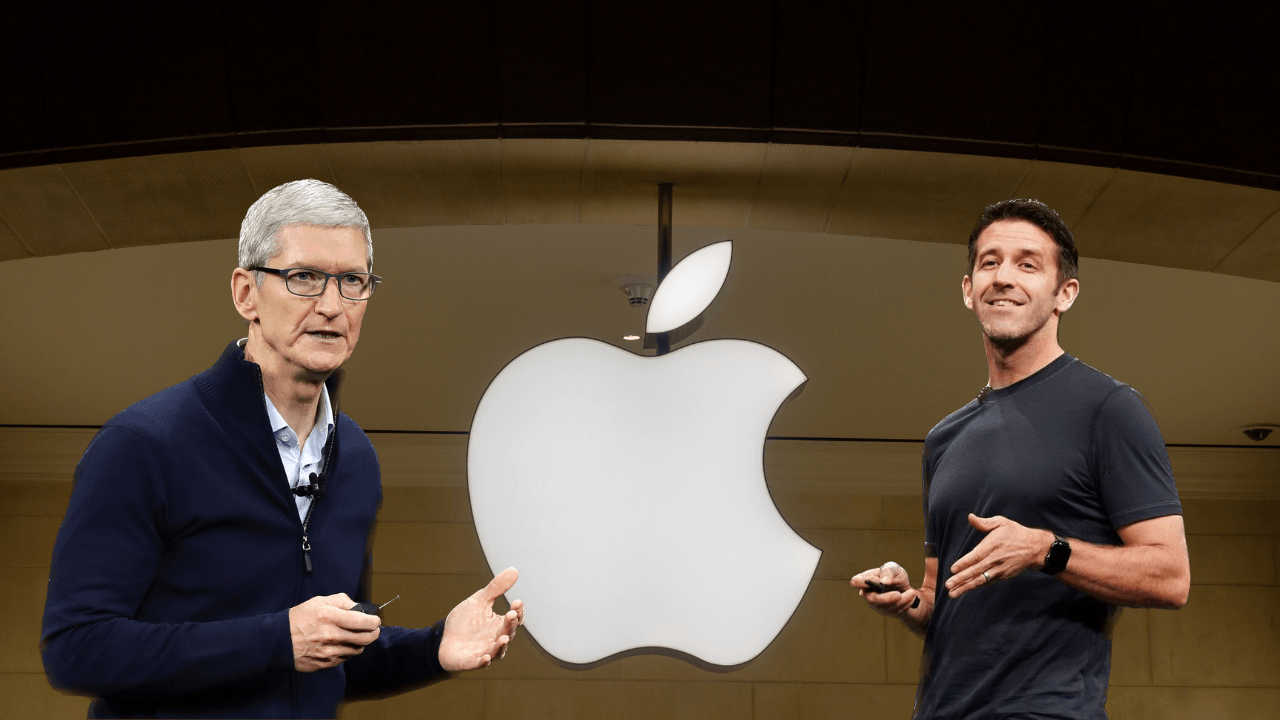Apple CEO Speculations Intensified as Tim Cook's Future Remained Uncertain

Summary
Speculation around Tim Cook’s future as Apple’s CEO has intensified, igniting global debate about who might lead the tech giant into its next era. With over 56,000 online discussions in just 24 hours, consumers voiced both anticipation and anxiety over potential leadership shifts that could reshape Apple’s identity, innovation pace, and pricing strategy. John Ternus, Apple’s hardware chief, has emerged as the most likely successor—praised for his engineering expertise but questioned for his limited exposure to services and AI. As Apple faces new challenges spanning artificial intelligence, regulatory complexity, and global market pressures, the company’s next leader must balance continuity with transformation. The outcome of this succession could redefine not only Apple’s internal direction but also the trajectory of the entire tech industry.
Apple CEO Speculations Intensified as Tim Cook's Future Remained Uncertain
In the past 24 hours, discussions surged across digital platforms with over 56,000 mentions about a possible successor to Apple CEO Tim Cook. This development sparked widespread consumer interest, along with concerns about what leadership changes could mean for the future of one of the world’s most valuable brands.
Consumer Concerns Reflected Broader Uncertainty
Consumers voiced several key concerns about what might happen if Cook exited. These concerns were shaped by potential shifts in strategy, product development, and pricing.
Continuity and brand stability topped the list, with 17% of consumers citing it as a major concern. Many worried a new CEO could steer Apple away from its core identity, leading to a drastic change in direction.
Innovation and product vision ranked close behind, with 13% of consumers expressing fear that a change in leadership could slow Apple's momentum in delivering industry-leading innovation.
Cost was another important factor. Around 10% of discussions included worries about product prices increasing across all categories under new leadership.
Device reliability, product quality, and ongoing support also came up, with 6% of consumers hoping that Apple’s trusted performance standards would not be compromised.
John Ternus Emerged as the Most Mentioned Successor
Among the names that surfaced in succession conversations, John Ternus, Apple’s Senior Vice President of Hardware Engineering, stood out. His name appeared frequently as a leading internal candidate to take over.
The positive sentiment toward Ternus centered on his long tenure with Apple and deep expertise in hardware. He was described as detail-oriented, trusted, and respected internally. His involvement in key product launches, including iPhones, iPads, and Macs, was seen as evidence of his strategic role within Apple’s ecosystem.
However, some concerns were raised. Ternus was seen as lacking experience in high-profile, cross-functional leadership roles. Critics pointed to a knowledge gap in services and software, which were increasingly critical to Apple’s long-term growth. There were also concerns that his hardware-first perspective might limit Apple's future expansion into artificial intelligence and ecosystem-based innovation.
Leadership Reshuffling at Apple Fueled Further Speculation
Several internal moves within Apple contributed to the leadership conversation. Jeff Williams, Apple’s Chief Operating Officer and a long-rumored successor to Cook, announced his retirement. This created a void in the executive pipeline and brought other names like Sabih Khan, recently named COO, into the spotlight.
Observers noted that Apple appeared to be raising Ternus’s profile intentionally, giving him more visible responsibilities in product announcements and internal planning. These strategic moves led many to believe that Apple was preparing for a seamless transition when the time came.
Apple's Next Phase Required Broader Capabilities
As Apple moved into a new era, its future leadership needed to manage more than just devices. The next CEO would need to lead across AI development, software innovation, services expansion, and regulatory navigation.
With AI gaining prominence, software and services were expected to play a central role in Apple’s future product ecosystem. A successful leader would need to integrate these elements while maintaining the quality and design principles Apple was known for.
In addition, the growing complexity of global markets, privacy laws, and supply chain dynamics demanded a CEO who could manage both technical depth and business strategy.
Signals of a Successful Transition and Potential Risks
A strong transition would be defined by a steady leadership change, clear communication about Apple’s long-term direction, and early actions that reinforced Apple’s strengths in innovation, quality, and customer trust.
Risks included the potential for product cost increases, consumer dissatisfaction, diminished product support, and leadership misalignment in software and AI. Public perception and internal morale could also suffer if the transition lacked clarity or seemed abrupt.
The speculation around Tim Cook’s future and Apple’s next chapter highlighted how high the stakes were.
Follow RILA GLOBAL CONSULTING for ongoing analysis, industry intelligence, and strategic perspectives on Apple and beyond.
Read More

ChatGPT Becomes the New Therapist and Dating Coach for U.S. Adults
A growing number of Americans are turning to ChatGPT not just for information, but for intimacy, reflection, and emotional healing. Between September and October 2025, online discussions about using ChatGPT as a therapist and dating coach surged — revealing a cultural shift where artificial intelligence is stepping into deeply personal spaces once reserved for humans. From helping users process grief and heartbreak to coaching singles through modern dating dilemmas, ChatGPT is becoming an emotional companion for a digital generation. As AI evolves from a productivity tool into an empathetic partner, it’s redefining how people connect, communicate, and care — prompting society to question not just what technology can do, but how it makes us feel.
October 16, 2025
READ MORE

Walmart’s AI Bet Sparks Backlash: Innovation Meets Consumer Anxiety
This collaboration aims to transform how people shop: AI will learn consumer preferences, anticipate needs, and complete purchases automatically, blurring the line between decision-making and delegation. Yet this futuristic convenience has triggered a wave of backlash. Many consumers view the partnership as another step toward automation that prioritizes efficiency over employment, deepening fears of job displacement across the retail sector. Social media reactions reveal a split between fascination and distrust — admiration for Walmart’s technological leap colliding with anxiety about corporate control of AI. The controversy underscores a defining tension of our time: as companies race to make life easier through artificial intelligence, the public is asking harder questions about who truly benefits — and who might be left behind.
October 16, 2025
READ MORE

How U.S. Consumers Talked About Tariffs in 2025: Wallets, Politics, and Global Tensions
English-speaking Americans largely saw tariffs through the lens of their wallets, describing them as a “hidden tax” driving inflation, while Spanish-speaking voices focused on food security, and U.S.–Brazil–BRICS relations. The digital debate fractured along lines of economics and identity: one camp lamenting higher prices, the other defending tariffs as a show of national strength. Yet across 25 million conversations, both groups arrived at a shared realization — that tariffs aren’t abstract policy levers but forces shaping what people can afford, how nations relate, and who ultimately bears the cost of global tension.
October 14, 2025
READ MORE

Behind the Breakthrough: How RILA GLOBAL CONSULTING Supported a Newly FDA-Approved Oncology Therapy
RILA played a critical role in supporting the recent FDA approval of a breakthrough oncology therapy designed for patients with limited treatment options after first-line chemotherapy. Acting as a strategic insights partner, RILA provided end-to-end intelligence—from identifying and engaging key opinion leaders to conducting patient unmet-needs analysis, complaint listening, and investor relations research. Our integrated approach combined social listening, pharmacovigilance, and competitive intelligence to guide scientific communication, regulatory readiness, and launch strategy. This approval not only represents an important advancement for patients and the oncology community but also highlights how RILA’s data-driven, patient-informed methodologies empower biopharma companies to bring meaningful, evidence-based innovations to market.
October 14, 2025
READ MORE

The Starbucks Effect in Reverse: What Store Closures Reveal About Housing and Community Stability
Once a marker of rising property values and revitalized streets, Starbucks’ retreat now sparks fears of community decline and economic fragility. As residents lament the loss of their local café, they’re really mourning a deeper shift—the unraveling of a familiar urban narrative where growth was measured by the green siren’s glow. In the “Starbucks Effect” reversed, America’s coffee map may be telling a new story about housing, belonging, and the fragile balance between commerce and community.
October 10, 2025
READ MORE

Why Food & Beverage Brands Can’t Ignore TikTok Recipes
The food and beverage industry is no longer shaped solely by glossy ads or in-store promotions — today, viral content and online conversations, especially on platforms like TikTok, drive consumer choices before they ever step into a store or restaurant. Brands that harness social listening and combine it with traditional market research can detect emerging trends, anticipate shifting tastes, and transform fleeting viral moments into lasting growth. At RILA Global Consulting, we turn digital chatter into actionable intelligence, helping companies stay ahead of the curve, innovate products, and craft culturally relevant campaigns that build loyalty and boost sales. In a world where trends can explode overnight, the ability to listen, interpret, and act is the ultimate competitive advantage.
October 3, 2025
READ MORE

How Airlines Can Detect Service Issues Before They Escalate Online
In today’s hyper-digital world, the battle for airline loyalty is no longer fought in loyalty programs or post-flight surveys—it unfolds in real time across TikTok feeds, Twitter threads, and Reddit forums. A single complaint can snowball into a viral crisis, yet the same digital conversations hold the key to preventing service failures and building trust. By merging social listening with market research, airlines can shift from reactive crisis control to proactive service strategy, transforming fleeting frustrations into lasting loyalty. The question is no longer if airlines should listen—it’s whether they can afford not
October 3, 2025
READ MORE

Consumer Insights on Smart Homes and Energy Efficiency
The energy and utilities sector is no longer about static bills and passive consumers—it’s about dynamic, digital-first relationships shaped by real-time conversations. From Reddit threads about thermostats to viral reviews of solar devices, consumers are rewriting the rules of engagement, demanding smarter, greener, and more personalized solutions. Companies that rely only on traditional surveys risk being left behind, while those embracing always-on social listening and market research gain the ability to anticipate needs, spark innovation, and lead the transition toward sustainable living. The question is: will brands continue to react to yesterday’s data, or will they start shaping tomorrow’s energy future today?
October 3, 2025
READ MORE

From Dealerships to TikTok: How Online Conversations Drive Auto Sales
The automotive industry is no longer ruled by showroom floors and brochures; it now thrives in the digital chatter of social media. Platforms like TikTok, Instagram, and Reddit have become the modern dealerships, where viral videos, candid reviews, and peer discussions shape the decisions of an increasingly informed consumer. Brands that harness these online conversations through social listening, analytics, and targeted engagement gain a strategic edge, transforming digital influence into tangible showroom visits and sales. RILA Global Consulting shows that understanding not just what consumers say—but how, where, and when they say it—can redefine the entire car buying journey, turning fleeting social trends into measurable business growth.
September 29, 2025
READ MORE